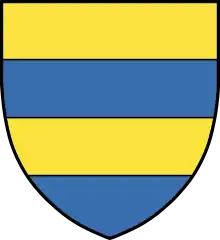Bielke
Bielke is an ancient Swedish noble family, originally from Småland and first mentioned in the 13th century.[1] It is the second-oldest such family still in existence after Natt och Dag. The comital family branch, descended from the first Count Nils Bielke af Åkerö (1644–1716), is still extant, while the baronial branch became extinct in the male line with the death of Johan Ture Bielke in 1792.[2]
- For the unrelated Danish-Norwegian noble family, see Bjelke (noble family).

Coat of arms of the Swedish Bielke family.
Members of the family include:
- Ture Turesson (Bielke) (1425–1489/1490), Swedish Privy Councillor, Lord High Constable
- Erik Turesson (Bielke) (d. 1511), Swedish Privy Councillor, Castellan of Vyborg Castle
- Anna Eriksdotter (Bielke) (1490–1525), Swedish noblewoman and acting castellan of Kalmar Castle, daughter of Erik Turesson
- Gunilla Bielke (1568–1597), Queen of Sweden, consort of King John III of Sweden
- Nils Bielke (1644–1716), Swedish Count, German Reichsgraf of Torgelow, Field Marshal and Governor-General of Pomerania
- Carl Gustaf Bielke (1683–1754), Count and book collector, Governor of Västernorrland County
- Sten Carl Bielke (1709–1753), Baron, judge and botanist, co-founder of the Royal Swedish Academy of Sciences
- Nils Adam Bielke (1724–1792), Count, Privy Councillor and Marshal of the Realm
- Johan Ture Bielke (1742–1792), Baron, son of Sten Carl Bielke, co-conspirator in the murder of King Gustav III of Sweden
- Nils Bielke (1792–1845), Count and courtier, Gentleman of the Bedchamber for the King of Sweden
See also
- René Bielke (b. 1962), German ice hockey player
- Don Bielke, American basketball player
Notes
- Swedish nobility did not use the practice of including family names in personal names until the late 16th century. The name was originally derived from the traditional family coat of arms and has been applied posthumously to earlier noble ancestors as well. In such cases, the family name is usually written in parenthesis.
- Carlsson, G. (1924), Bielke, släkt in the Dictionary of Swedish National Biography.
This article is issued from Wikipedia. The text is licensed under Creative Commons - Attribution - Sharealike. Additional terms may apply for the media files.